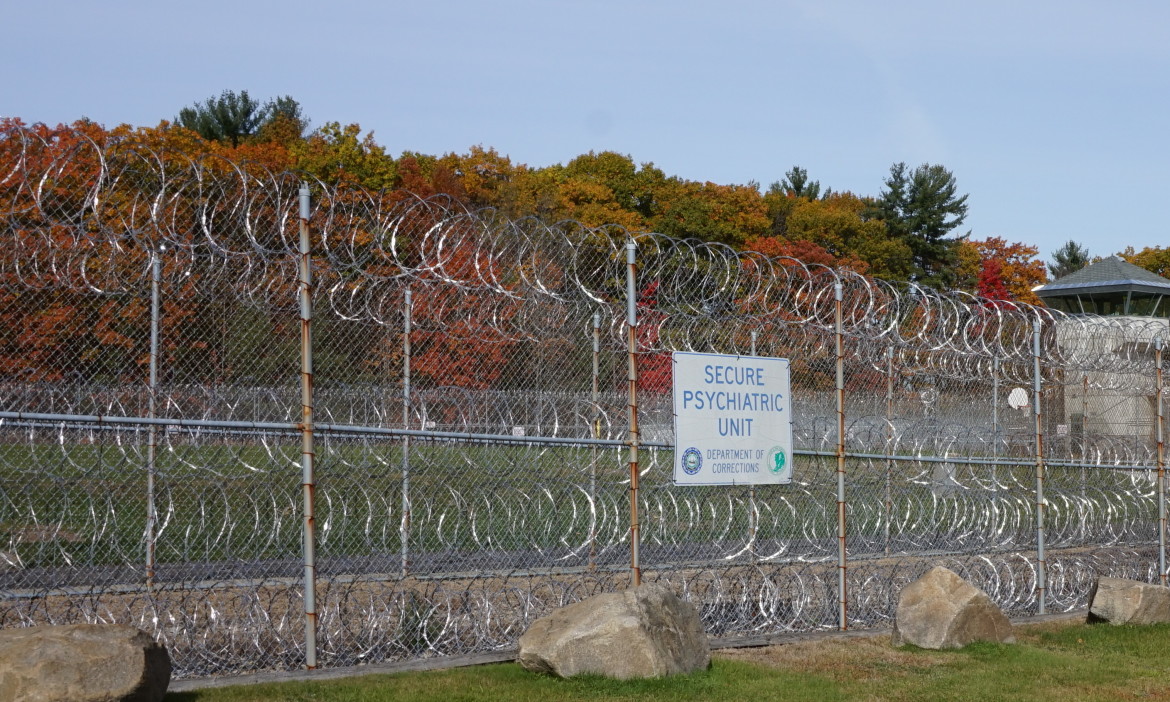
Frankie Berger, director of advocacy at the Treatment Advocacy Center in Arlington,Va.
A national group that helps people with severe mental illnesses is pushing to stop New Hampshire from housing civilly committed patients who haven’t committed a crime at the Secure Psychiatric Unit at the state prison for men.
Frankie Berger, director of advocacy at the nonprofit Treatment Advocacy Center, said the practice violates patients’ civil rights and must stop immediately.
“We had no idea this type of thing was happening,” Berger said. “Honestly, it’s appalling and shocking what we’ve learned so far. We need to see it fixed.”
The Arlington, Va.- based center is taking immediate action to investigate and press for action that could result in a federal civil rights lawsuit, Berger said.
Berger disagreed with the Department of Corrections’ contention that the Secure Psychiatric Unit is a hospital.
There’s no oversight, no reporting, she said. “I don’t know how that can possibly be a hospital.”
Jeff Lyons, spokesman for the Department of Corrections, said the way New Hampshire law is written, civilly committed patients who haven’t committed or been convicted of a crime, but are danger to themselves or others, must be housed in the Secure Psychiatric Unit.
“They are placed in the Secure Psychiatric Unit because they exhibit more violent tendencies than the other patients at the New Hampshire Hospital,” Lyons said.
The New Hampshire Hospital, located about three miles from the state prison in Concord, is a less restrictive, but locked campus. It is the state’s main psychiatric hospital and is run by the Department of Health and Human Services.
“Until such time as there is another option in New Hampshire, this is where they will be housed,” Lyons said of the Secure Psychiatric Unit.
The Department of Corrections has agreed in the past with study committees about the need to build a new secure wing on the grounds of the New Hampshire Hospital, Lyons said.
The department does consider the Secure Psychiatric Unit to be a hospital. “We have the same medical and mental health treatment,” Lyons said.
State Rep. Renny Cushing, D-Hampton, submitted legislation this session – as he has in the past – that would require alternative housing besides prison for mentally ill patients who haven’t committed a crime, but are considered dangerous.
The House Health and Human Services Committee ultimately decided to study the problem again during the summer.
“I don’t think it comes as a surprise that a national organization with expertise in this area comes to the conclusion that New Hampshire is violating patients’ rights,” Cushing said.
The Legislature recognized the problem in 2005 and 2010, he said. “Reports then acknowledged the potential for legal action against the state,” Cushing said.
“It’s long past time that the state of New Hampshire stop taking people who have never been charged with or convicted of a crime and sending them to prison. We should be sending them to hospitals, not prison,” Cushing said.
Berger agreed that the practice of commingling patients who haven’t committed a crime with convict criminals has to stop. “It doesn’t matter how many laws the Legislature passes in New Hampshire to say it’s legal. That doesn’t make it legal,” Berger said. “It is unconstitutional.”
Berger said she learned of the practice through an opinion piece written by registered nurse Beatrice Coulter for a local newspaper condemning the practice.
Coulter worked for four days at the Secure Psychiatric Unit before resigning over what she saw as unethical treatment, especially given that civilly committed patients who hadn’t committed a crime were housed there.
Coulter has since formed a group called Advocates for the Ethical Treatment of Mental Illness. “I think all of these practices need an outside agency to look at the Secure Psychiatric Unit,” Coulter said recently.
The state Department of Corrections has said in the past that the number of patients who haven’t been convicted of crimes that are housed in the unit can vary daily.
At different times, estimates have ranged from seven to 16 patients being house at SPU who hadn’t been convicted of a crime. Some stay only a matter of days and others may stay for years.
The unit population includes patients who haven’t committed a crime, those who have been deemed incompetent to stand trial, those found not guilty by reason of insanity and mentally ill patients who have committed serious crimes such as murder and rape.
The state’s most dangerous sex offenders are housed there. Ten mentally ill women are also housed at the Secure Psychiatric Unit on the otherwise all-male campus.
“We are going to do everything we can to stop this,” Berger said.
Federal lawsuits in other states have prompted changes relative to the treatment of people with mental illness in prisons.
“But the New Hampshire example is by far the most egregious one that I’ve heard of,” Berger said. “It’s so bad that it is something that needs to be stopped right away. We’re going to move on it as soon as possible.”





